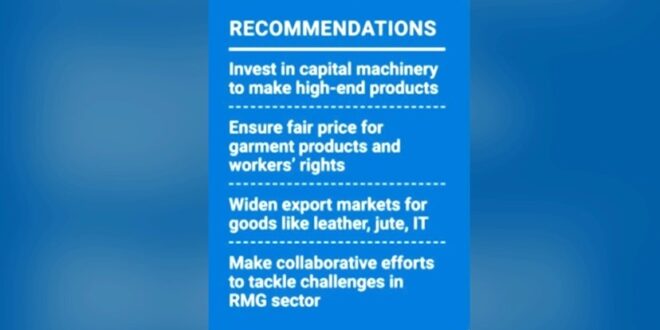Stakeholders including experts on industries and economists underscored the need for diversifying export products to ease dependency on the garment industry and achieve industrial sustainability while economic challenges persist.
They also emphasised enhancing workers’ skills, productivity and handling challenges through collective efforts.
The observations came at a seminar titled, “Global Economic Slowdown, Bangladesh’s Apparel Industry and Decent Work”, organised by Bangladesh Institute of International and Strategic Studies (BIISS) at its auditorium in Dhaka on Sunday.
Dr Mashiur Rahman, former economic affairs adviser to the prime minister, attended the seminar as the chief guest. He called on investors to invest in capital machinery to make high-end products, and logistics for better transportation management which would help grow the country’s economy.
He also highlighted data and information as “it is key to change economic structure.”
BIISS Research Director Dr Mahfuz Kabir presented the keynote paper. He said the country’s businesses were facing a myriad of challenges due to global economic slowdown and lack of investment.
“Despite the fact that Bangladesh’s garment export volume is rising, the country receives lower prices than its competitors like India, Vietnam, Sri Lanka, and Turkey,” he said, adding that the country needs to pay attention here, and increase productivity of workers as well as maintaining international issues to get fair prices,” he said.
Distinguished Fellow of the Centre for Policy Dialogue (CPD) Prof. Mustafizur Rahman also spoke on the occasion. He said the annual exports of Vietnam stands around $300 billion where Bangladesh’s export is yet to exceed the $100 billion mark.
“However, Bangladesh has huge opportunities to export different non-ready-made garments (RMG) products like medicine, leather and leather goods, jute, and IT, among others. We have to go to other sectors reducing dependency on the garment industry,” the economist added.
Prof Mustafizur stressed the need for good governance and achieving labour rights as well as ensuring GSP plus facilities.
“We should make a functioning economy by taking the right policy now. Bangladesh’s foreign reserves dipped to $19 billion from $48 billion. Because of this, our businesses are facing problems with opening letter of credit (LC),” he added.
He observed that the current minimum wage fixed at Tk12,500 for ready made garment (RMG) workers was not enough for a decent living.
The economist suggested that “a number of issues need to be taken care of” to be able to raise the wage of workers,
Masud Bin Momen, senior secretary at the Foreign Affairs Ministry, touched upon the issue of the newly announced US labour policy and emphasised collaborative efforts among the government, entrepreneurs and workers to tackle any future challenges in the RMG sector.
He commented that Bangladesh should strive for achieving the double bottom-line of ensuring labour welfare and remain competitive in the global market.
“We need to go to high end and high valued garment products, and look for new markets across the globe. So, collective efforts are crucial. It will help to tackle the post LDC challenges,” he said.
Tapon Kanti Ghosh, senior secretary at the Commerce Ministry, said, “Amid the current economic slowdown, Bangladesh’s RMG export is good as we took a lot of initiatives. However, further market diversification is important for us.”
Bangladesh Garment Manufacturers and Exporters Association (BGMEA) president Faruque Hassan urged buyers to pay ethically sound prices for the RMG products made in Bangladesh.
“If we want to keep ourselves relevant in the global market, there is no alternative to focusing on innovation, technological up-gradation, design and skill development and increasing overall business capabilities,” he added.
According to the Export Promotion Bureau (EPB), the country’s total exports reached $55.55 billion in the last fiscal year 2022-23. Of this, the RMG export was $23.5 billion.
(DS)
 Welcome to Business Outlook
Welcome to Business Outlook




